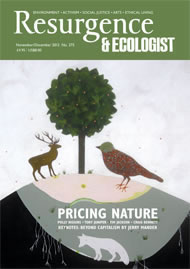The trick with this book is to read the contents page first, then you won’t get lost. It’s divided into three Peregrinations, which take you on three different odysseys, and once you’ve got that you’ll have your compass.
It’s an offbeat read, having a stream-of-consciousness stamp about it, at times being intensely personal and at other times aloof. Melanie Challenger treats us to a galaxy of thinkers who have commented upon humanity’s guardianship or exploitation of the natural world and how that, from time to time, has disposed of itself. Mixing in personal reminiscence – including the presence of an influential grandmother – she intersperses the whole with clunky poetic asides, making it a rounded work on a subject well researched and deeply felt – a diverting contrast to the dry tomes that science so often hurls at us.
Her first Peregrination begins in Cornwall, with the demise of the tin-mining industry – an industrial extinction. Challenger describes what that collapse did to the community and landscape; and although much was lost, much was gained: wildlife opportunistically inhabited abandoned mines, birds – peregrines and nightjars – and bats reappeared, as did certain species of plants tolerant of copper in topsoil. Recalling a line from Darwin, she points out: “lighten any check, mitigate the destruction ever so little, and the numbers of species will increase to any amount.”
Contrasting this with the collapse of the Cornish fishing industry, which coincided with the depletion of world fish stocks, she offers a quote from George Perkins Marsh: “man is everywhere a disturbing agent ... Wherever he plants his foot, the harmonies of nature are turned to discords.”
She offers a brief discourse on early Greek thought, where the natural world was considered to be for human exploitation, which had dramatic influence on how the natural world was perceived. Cicero’s On the Nature of Gods talks of the superior rights of human beings, suggesting the principle of a world made for human consumption. From Genesis to Aquinas there exists a presumption of Nature for the use and exploitation by humans, in all its hierarchy of life forms, “to all diversify beneath humans as the ordered design of dominion”. She quotes Locke: “subduing or cultivating the earth ... and having dominion we see are joined together.” Even Francis Bacon thought that the noblest thing humankind can aim for is domination of the universe. She ponders our responses, ethical and emotional, to this.
The second Peregrination finds Challenger in South Georgia, where she gives us Willem Van der Does’ grim prognosis of 1934 that “whales are creatures that are doomed to disappear ... from the earth ... despite all legal measures to prevent it.” Wandering amid the ghostly debris of the former whaling station, she reminds us of the ozone hole and leaps from subject to subject, from the Nazis to the rise of technology, the reason for the interlude being to point out that whale products didn’t just go into brooms, corsets and street lamps: they went into explosives – a neat, brutal adjunct to her point.
The last Peregrination brings us back to Whitby in Yorkshire and its links with Dracula – a metaphor for humanity’s vampiric predilections – and the whaling industry. Then we’re off to the Inuit of Canada, the melting snowcap and ice floes, the tragedy of the people, the suicides, alcoholism and loss of place, the destruction of their traditional way of life, and whale hunting for survival as opposed to profit. It’s a bleak picture.
Challenger ends in The Fens, where, surprised by her own lack of knowledge of wild flora, she sets about remedying it and even then notices how restricted the varieties are: even the flora are becoming curtailed. To underline it, she reveals that over 7,000 of the world’s languages are on the disappearing list.
On Extinction doesn’t have an emphatic conclusion. Rather it is a litany of doctrines, philosophies and technological advances that have sped up the process of humankind’s increasing estrangement from the natural world. This is perhaps best summarised by Challenger’s Karl Marx quote that a world less reliant upon Nature would be bound to wind up earning, working and buying in order to sustain itself, leading ultimately to wholesale servitude to economic pressure alone.
Jeremy James's book The Alchemical Horseman was reviewed in the July/August 2012 issue of Resurgence. www.resurgence.org/magazine/article3710-an-alchemical-journey.html







